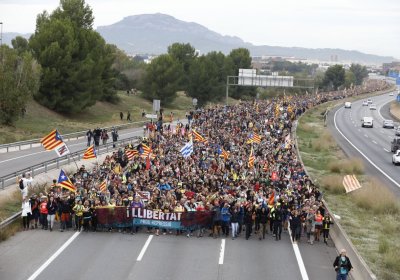Whenever supporters of Catalan sovereignty and independence have been asked to travel far from home to champion their country’s democratic rights, they have always rallied to the cause, writes Dick Nichols from Barcelona.
Dick Nichols
Capitulation to the Spanish state has blown apart Catalonia's pro-independence alliance and forced an early election, writes Dick Nichols from Barcelona.
By the narrowest of margins (167 votes to 165 with 18 abstentions), the 350-seat Spanish Congress invested a coalition government of the social-democratic Spanish Socialist Workers Party (PSOE) and the more radical Unidas Podemos (UP) on January 7.
No Spanish prime minister has ever been elected by so low and so close a vote: eight of the parliament’s eighteen parties voted in favour, eight against and two abstained.
On November 12, largely in reaction to the rise of the right-wing Vox, Socialist Workers' Party leader Pedro Sánchez and Unidas Podemos' Pablo Iglesias stitched up a pre-agreement for government in less than 48 hours, writes Dick Nichols.
The final act in a week of protest in Catalonia, against the vindictive jail terms imposed on nine Catalan leaders by the Spanish Supreme Court on October 14, was a general strike and vast demonstration in the capital, Barcelona.
Infuriated by the verdict, frustrated with the strategy of the established independence movement (seen as “getting nowhere”), and most of all, outraged by police violence, young Catalans, who had never been on a barricade in their lives, decided that “direct action” was the only solution, writes Dick Nichols.
After the Spanish Supreme Court sentenced nine political and social Catalan leaders on October 12 to a total of 99.5 years jail for organising the October 1, 2017 independence referendum, the struggle for the country’s right to self-determination entered a new phase.
Denmark’s Red-Green Alliance (RGA) held its 30th congress in Copenhagen on October 5-6, in a political context that contrasted strongly with that of its previous congress.
Eighteen months ago the party’s 300-plus congress delegates were preparing for a general election they hoped would lift the RGA into the role of main challenger to the Social Democrats for hegemony over what is called the “red bloc” in Denmark.
Former metalworker Søren Søndergaard, who represents the outer Copenhagen electorate of Gladsaxe in the Danish parliament, has a long history in radical left politics.
In the 1980s, he was part of the leadership of the Socialist Workers Party, one of the three founding organisations of the Red-Green Alliance (RGA), known in Denmark as the Unity List — the Red-Greens.
The gap between the 75%–80% of Catalans who uphold their country’s right to self-determination, and the Spanish elites and parts of Spanish society that do not want to know anything about it, was already very wide before October 14.
But on that day, when the Spanish Supreme Court condemned nine Catalan political and social movement leaders to a total of 99.5 years jail, it most likely became unbridgeable, writes Dick Nichols from Barcelona.
The results of the October 6 elections for the 230-seat Portuguese parliament delivered four main outcomes: a historic thrashing of the right; a strong lift in support for the governing Socialist Party (PS); increased variegation of the vote to the left of PS; and a record abstention rate, writes Dick Nichols.
This blog, compiled by Green Left Weekly's European correspondent Dick Nichols, based in Barcelona, follows the trial in the Spanish Supreme Court of the 12 Catalan social and political leaders, who face up to 25 years jail for alleged offences of rebellion, sedition and embezzlement of public funds. It is updated regularly.
Spain’s acting Prime Minister Pedro Sánchez, leader of the Spanish Socialist Workers’ Party (PSOE) and winner of the April 28 general election, informed King Philip on September 17 that he lacked the support to form a government. As a result, another general election will be held on November 10.
- Previous page
- Page 6
- Next page











